Professor Selma Rizvic, Ph.D., IMVRP Study Program Coordinator
Dr Selma Rizvić is a Professor of Computer Graphics at the Faculty of Electrical Engineering, University of Sarajevo. For 23 years she has been teaching there Bachelor, Master and Ph.D. study programs. From 2005-2010 she has been engaged as well at the Sarajevo School of Science and Technology, where she established computer graphics courses and a Digital Media Center laboratory. Since 2021, she is engaged in the Game Design and Development Program.
At the University of Sarajevo, she founded 2004 the Laboratory for Computer Graphics – Sarajevo Graphics Group. It is a research group that specializes in the use of IT technologies for the presentation of cultural heritage. The SGG research group is multidisciplinary, it includes computer graphics experts and works with archaeologists, historians, visual artists, writers, and film professionals, in order to design and implement virtual cultural heritage applications which have both educational values and are engaging, entertaining and attractive at the same time. In 2010 they founded the Association for cultural heritage digitization DIGI.BA.
The unique expertise of SGG/DIGI.BA in interactive digital storytelling embedded in a number of virtual archaeology projects brought them invitations in major EU consortiums. From 2011-2015 they have been a partner in the FP7 NoE Virtual Museum Transnational Network V-MusT.net and in H2020 iMARECULTURE. Presently they are coordinating the EACEA Creative Europe SHELeadersVR project, and implementing several smaller local and regional projects.

Dr. Belma Ramic-Brkic is an Associate Professor and the Dean of the Computer Science Faculty at the University Sarajevo School of Science and Technology. She holds a Ph.D. degree from the International Digital Laboratory, Warwick Manufacturing Group (WMG), University of Warwick, UK. Has an MSc (2009) and a BSc (2006) with honors from the Faculty of Electrical Engineering, University of Sarajevo, Bosnia and Herzegovina.
Dr. Ramic-Brkic’s research interests include serious games, cultural heritage digitization, computer vision, image and video processing, and machine learning. She has authored and co-authored numerous publications in respected academic journals and conference proceedings, and is an active member of the academic community, serving on editorial boards and as a reviewer for various academic journals and conferences.
In addition, she has extensive experience as a project manager and consultant in the field of computer science. Dr. Ramic-Brkic has also been recognized with multiple awards for her contributions to the fields of computer science and information technology, including the 2022 Faculty Excellence Award, and the 2019 Excellence in Research Award.
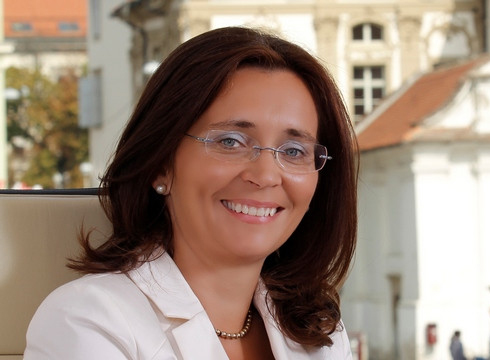
Dr. Suzana Žilič Fišer is an Associate Professor and a head of Institute of Media Communication at the University of Maribor. She studied at the University of Ljubljana, Central European University of Budapest and conducted her PhD research as the Chevening scholar at the University of Westminster in London and at PCML in Oxford. She was a visiting lecturer at various universities in Europe and spent ten years in the media industry. In her research she mainly focuses on communication, broadcasting, public interest and political communication in the media. She has published a monograph about Public service broadcasting, chapters in different books (by Palgrave MacMillan, IGI Global, Routledge communication series) and articles in the international scientific journals, and participated in different international scientific conferences. In the past years she was also the President of the Media committee appointed by the Ministry of Culture in Slovenia.
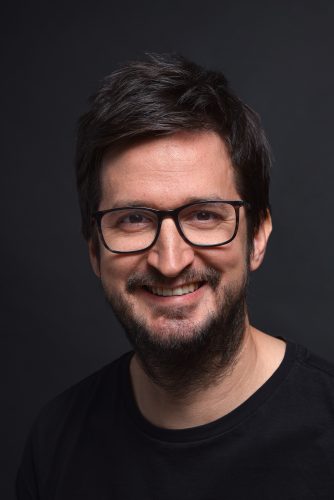
Dr. Matej Novotný studied mathematics and computer science at Comenius University in Bratislava. His expertise includes data visualization, interactive computer graphics, visual computations, and virtual reality. His company VIS GRAVIS develops customized interactive graphical applications, mainly for information visualization and for interactive presentation of cultural heritage. He has extensive experience in teaching computer graphics and creative programming. His current affiliation is with the Academy of Fine Arts and Design in Bratislava where he co-founded the study program Digital Arts and has an Associate Professor position.
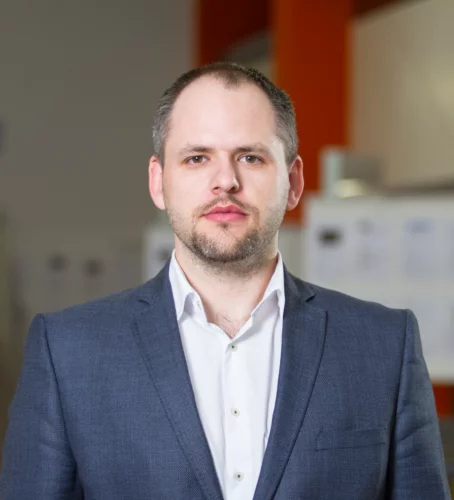
RNDr. Ján Lacko, PhD. is the dean of the Faculty of Informatics of the Pan-European University. He is the head of the Virtual and Augmented Reality Laboratory included in the global network of VR First laboratories. The course focuses on subjects related to visual data processing and computer graphics, including its applications. He teaches the subjects of Web technologies and design, Visual computing and multimedia, Modeling and Animation, and Virtual and augmented reality. In the field of research, he has long been engaged in research activities focused on applications of virtual reality in the areas of healthcare, presentation of museum data, education, and industry.

Dr. Selma Alispahic is one of the most prominent theatre and film actresses in South East Europe. She is a principal actress in the Sarajevo War Theatre since 1998. and her roles include Anna Karennina, Sylvia Plath, Carmela, Caroline Neuber, Queen Catherine, and many others. She also lived and worked in London and performed at the Royal National Theatre, Complicite theatre, Young Vic Theatre, BBC Radio, Channel 4 and collaborated with Simon McBurney, James Fox, Paul Yule, Tim Supple, Juliet Stevenson, etc. For her work, she received many national and international awards, among them the Actress of Europe Award for 2018. , Women of the Year in the Arts of BiH Award and Freedom Award from The International Center for Peace Sarajevo. She teaches Acting and Working with actors at Sarajevo School of Science and Technology and holds a Ph.D. in literary history science.
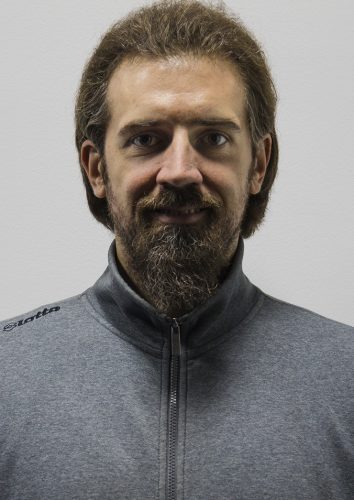
Bojan Mijatovic, MA is currently working as a graduate teaching assistant at the Faculty of Game Design and Development and Sarajevo Film Academy, Sarajevo School of Science and Technology. He holds a Master’s degree in Communicology as of 2015 and is currently in Ph.D. program at Faculty of Electrical Engineering – Media Communications program in Maribor. He is involved at Sarajevo Film Academy since 2013 where he first worked as a Lab coordinator and Teaching assistant afterward. Bojan has a great passion for new technologies and throughout his work he was always closely working with different IT departments at different part-time jobs like Al Jazeera and Hyundai. He explores new possibilities of media, digital narration, and storytelling. Exploration in new media led him to DIGI.BA Association, where he worked on the project H2020 iMARECULTURE and after the project he fully joined DIGI.BA working as a Production assistant, cinematographer, sound recordist, and equipment coordinator.
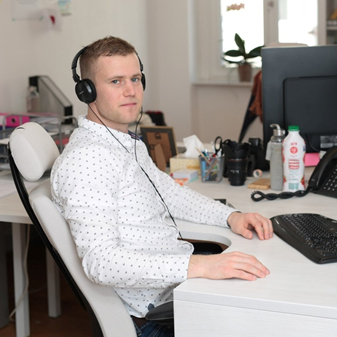
Jani Pavlič, MA
Master’s degree in Media Communications at the University of Maribor (UM). Video production for regional television and NGOs. Videography as a part of project activities (e. g., My Language in the Digital World, CROSSRISK – reducing snow-related risks). Executing the practical part of the multimedia production courses at the UM, including 360° videos. PhD student, examining product placement in the context of 360° video production. Relevant publication: Pavlič, Jani, and Tina Tomažič. “360 Video as an Opportunity for the Inclusion of Product Placement.” Handbook of Research on Transmedia Storytelling, Audience Engagement, and Business Strategies. IGI Global, 2020 // Co-mentor in students’ thesis and research projects. Relevant master’s thesis: Influences of different graphical navigation systems on viewers of 360° animation.

Matevž Pucer, MA
Teaching assistant at Media communication institute, University of Maribor (UM). Master’s degree in Media Communications (UM). Bachelor’s degree in film production. 10-year career in the media industry and NGOs in the field of video production and photography, focusing on commercial video production and advertising. In the last years he is executing the practical part of multimedia production courses at UM, including 360 videos and photography.

